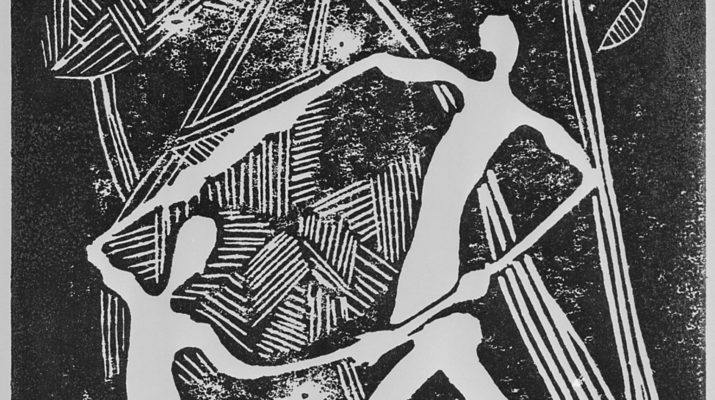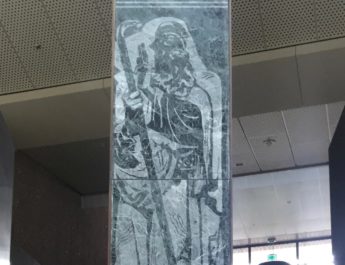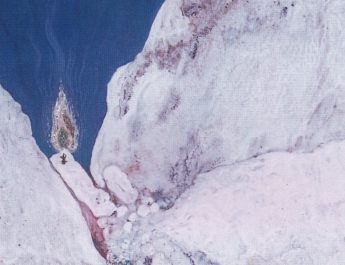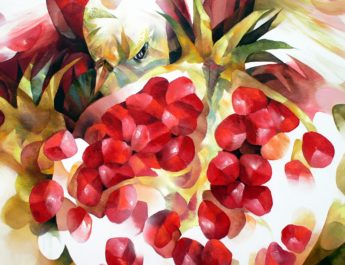Psalm 129
A “Song” = shir. From shir (to sing; one who is singing or leading others in song). This is song or singer.
B “Ascents” = ma’alah. From ma’aleh (ascent, platform, slope, stairs, cliff, elevation, a rise; figuratively, a priority); from alah (to go up, ascend, be high, be a priority; to arise in a literal or figurative sense). This is something that arises, elevation, a journey to a higher pane. This can be used figuratively to mean having a though or being of a superior status. It is often used in a specific sense for something the mounts to a climax. This is step, stair, or high degree.
1 OftenC have they attackedD me from my youthE
—let IsraelF nowG say—
2 often have they attacked me from my youth,
yet they have not prevailedH against me.
C “often” = rab. From rabab (increasing in any aspect whether quantity, authority, size, quality, greatness, etc.). This is abundance, many, elder, exceedingly, great. It refers to abundance of amount, rank, or status.
D “attacked” = tsarar. This is to bind, restrict, narrow, be cramped, an adversary.
E “youth” = naur. From naar (child or a servant; a child in their active years so they could be aged anywhere from infancy to adolescence); perhaps from naar (to shake, toss up and down, tumble around). This is youth or childhood.
F “Israel” = Yisrael. From sarah (to persist, exert oneself, contend, persevere, wrestle, prevail) + el (God or god). This is Israel, meaning God strives or one who strives with God; new name for Jacob and for his offspring. This refers to the people and to the land.
G “now” = na. This particle is used for requests or for urging. It can be we pray, now, I ask you, oh. This is the same “na” in “hosanna.”
H “prevailed” = yakol. This is to be able, endure, overcome, prevail.
3 The plowersI plowedJ on my back;K
they made their furrowsL long.M
I “plowers” = charash. Same as “plowed” in v3. See note J below.
J “plowed” = charash. This is to scratch, which implies etching or plowing. It can mean to manufacture regardless of materials used. Figuratively, it can be to devise or conceal. It can also have a sense of secrecy. Hence, being silent or left alone. It can also be speechless.
K “back” = gab. 13x in OT. Root may mean to curve or hollow. It is a back because it is rounded, the brow of the eye, rim, a vault, higher place, or shrine.
L “furrows” = maanah. 2x in OT. From anah (to be busy, afflicted) OR from anah (to be bowed down; humility or being browbeaten, oppressed, afflicted, or depressed; literal or figurative – depressed in mood or circumstance). This is a furrow or a field.
M “made…long” = arak. This is to continue, lengthen prolong, delay, or endure. It is being long or causing something to be long in a literal or figurative sense.
4 The LordN is righteous;O
he has cutP the cordsQ of the wicked.R
N “Lord” = YHVH. From havah (to be, become) or hayah (to come to pass, become, be). This is the name of the God of Israel, the self-existent and eternal one, the tetragrammaton. This pronunciation has been lost to time so “Lord” is generally used in its place.
O “righteous” = tsaddiq. From the same as tsedeq (rightness, righteousness, just cause, vindication; that which is right in a natural, moral, or legal sense; abstractly equity; figuratively prosperity). This is just, innocent, righteous, righteous one, or lawful.
P “cut” = qatsats. 14x in OT. This is to cut or chop off in a literal or figurative sense. It an also be to cut in pieces.
Q “cords” = aboth. From abath (to weave, wind, or interlace). This is a cord, string, band, wreath, branch, or foliage.
R “wicked” = rasha. This is morally wrong so it refers to someone who is actively bad as wicked, criminal, an evil person, offender, condemned, or ungodly.
5 May allS who hateT ZionU
be put to shameV and turnedW backward.X
S “all” = kol. From kalal (to complete). This is all or every.
T “hate” = sane. This is to hate, an enemy. It is a personal hatred and not an abstract one.
U “Zion” = Tsiyyon. Related to tsyiyyun (signpost, monument); from tsavah (to charge someone, to command, order); from the same as tsiyyah (dryness drought); from a root meaning parched as desert, dry land. Zion can refer to a mountain in Jerusalem as well as another name for Jerusalem itself or the people.
V “put to shame” = bosh. Properly, this means to be pale, which implies shame, disappointment, or confusion.
W “turned” = sug. 14x in OT. This is to turn back, aside, or away. Properly, it means to flinch, which implies moving away or going back. Literally it can mean retreat or figuratively it can mean backslide i.e. apostatize.
X “backward” = achor. From achar (to be behind, delay, be late, procrastinate, continue). This is the back, behind, backward, time to come. It can also refer to facing to the north or the west.
6 Let them beY like the grassZ on the housetopsAA
that withersBB beforeCC it grows up,DD
Y “be” = hayah. Related to “Lord” in v4. See note N above.
Z “grass” = chatsir. Perhaps from the same as chatsir (village, settlement); from chatser (enclosure or court – a yard that is fenced in. It could also be a village or hamlet that is walled in); from chatsar (to blow a trumpet, trumpeter, to surround); from chatsotsrah (trumpet). This is grass, plant, hay, leeks.
AA “housetops” = gag. Perhaps from ga’ah (to rise up, increase, grow, be highly exalted; figuratively to be majestic). This is a housetop or other top. It can refer to the surface of an altar.
BB “withers” = yabesh. This is to be dry, withered, confused, or ashamed. It can also be to fail.
CC “before” = qadmah. 6x in OT. From the same as qedem (front, formerly, before, east, eternal, everlasting, antiquity). This is former, from antiquity, before.
DD “grows up” = shalaph. This is to draw out, pluck off, grow up.
7 with which reapersEE do not fillFF their handsGG
or binders of sheavesHH their arms,II
EE “reapers” = qatsar. This is to cut down, be short, reap, curtail. It is used especially for harvesting grass or grain. Figuratively, it can mean to be discouraged or grieve.
FF “fill” = male. This is fill, satisfy, replenish, accomplish, fulfill, confirm, or consecrate. It is fill in a literal or figurative sense.
GG “hands” = kaph. From kaphaph (to bend – from a root meaning curve or bend down). This is palm of the hand or sole of the foot, footstep, grasp. Figuratively, it can also mean power.
HH “binders of sheaves” = amar. 3x in OT. This is to heap, to gather into sheaves, to abuse or enslave.
II “arms” = chetsen. 1x in OT. May come from a word meaning holding firmly. This is bosom or arms.
8 while those who pass byJJ do not say,
“The blessingKK of the Lord be upon you!
We blessLL you in the nameMM of the Lord!”
JJ “pass by” = abar. This is to pass over or cross over. It is used for transitions, whether literal or figurative. It can also mean to escape, alienate, or fail. This is the root verb from which “Hebrew” is drawn.
KK “blessing” = barakah. From barak (to kneel, bless; blessing God as part of worship and adoration; blessing humans to help them; can be used as a euphemism to say curse God). This is blessing, which implies prosperity or peace.
LL “bless” = barak. Related to “blessing” in v8. See note KK above.
MM “name” = shem. May be from sum (to put, place, set). This is name, fame, renown. A name was thought to indicate something essential about a person – something about their individuality. So, this word can also mean honor, authority, or character.
Image credit: “Eketete and Erbeybuye” by Bruce Obomeyoma Onobrakpeya, 2011.




